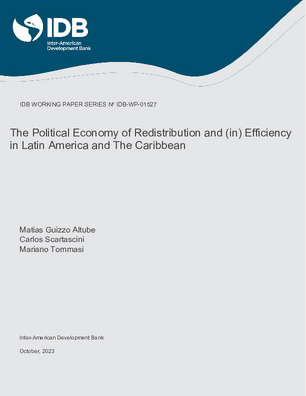The Political Economy of Redistribution and (in)Efficiency in Latin America and the Caribbean
Date
Oct 2023
Predominant views on the political economy of Latin America and the Caribbean tend to emphasize that elite domination helps to understand the high levels of inequality. The contemporary fiscal version of that assertion goes something like “the rich are powerful and they dont like taxes, hence we have little taxation and little redistribution.” That is a good approximation to the reality of some countries, but not of others. There are cases in the region where there are high levels of taxation and non-negligible redistributive efforts. But in some of those cases such redistribution comes hand in hand with macroeconomic imbalances, high inflation, low growth, as well as low-quality public policies. When redistributive efforts are short-sighted and attempted with inefficient public policies, fiscal imbalances lead to inflation and to frequent macroeconomic crises that reduce growth and thwart poverty reduction efforts.
The argument of this paper is that there are various possible political configurations (including elite domination and populism among others) that lead to different economic and social outcomes (including the degree of redistribution and others). We postulate that each configuration of social outcomes emerges out of different political economy equilibria. Different countries in the region will be in different political economy equilibria, and hence will have different combinations of political economy syndromes and of socioeconomic outcomes.
In this paper, we characterize the countries regarding the size of the public sector, how much fiscal redistribution there is, and how efficient this public action is. We summarize various strands of literature that attempt to explain some elements of that fiscal vector one at a time; and then attempt to provide a simple framework that might explain why different countries present different configurations of size, distributiveness, and efficiency.
The argument of this paper is that there are various possible political configurations (including elite domination and populism among others) that lead to different economic and social outcomes (including the degree of redistribution and others). We postulate that each configuration of social outcomes emerges out of different political economy equilibria. Different countries in the region will be in different political economy equilibria, and hence will have different combinations of political economy syndromes and of socioeconomic outcomes.
In this paper, we characterize the countries regarding the size of the public sector, how much fiscal redistribution there is, and how efficient this public action is. We summarize various strands of literature that attempt to explain some elements of that fiscal vector one at a time; and then attempt to provide a simple framework that might explain why different countries present different configurations of size, distributiveness, and efficiency.




